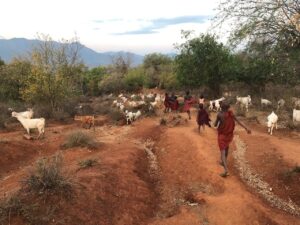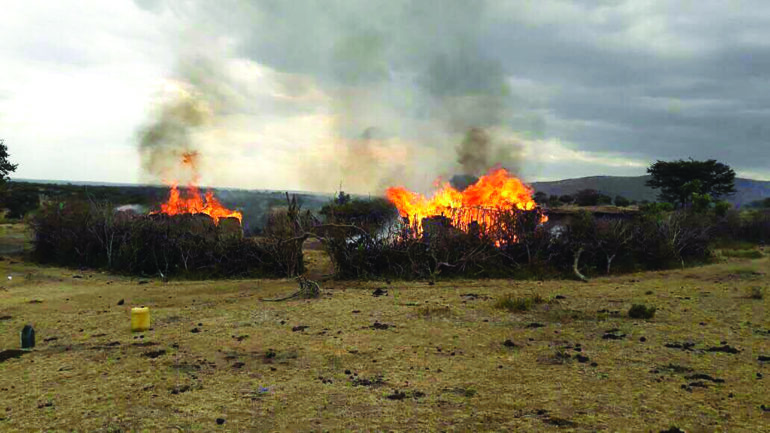Tanzania is facing a delicate balance between protecting the second largest national park, Ngorongoro Conservation Area in the north and the rights of the pastoral Masai community to derive their livelihood from the lands they have occupied for decades.
About 80,000 members of the Maasai community are facing eviction from Loliondo, a district within the Ngorongoro Conservation Area to protect wild animals and the environment from degradation due to human settlement and grazing.

In April, civil society groups petitioned the UN Conference on Permanent Forum on Indigenous Issues which was held in New York, against the Tanzanian government for infringements of rights and loss of property due to the evictions that began in June last year.
The Pastoralists Indigenous Non-Governmental Forum claims that some 600,000 livestock have been killed by drought due to restricted access to water and grazing and ten thousand others have been auctioned by the Tanzania government.
The bone of contention is that the government wants to dispossess the Maasai of 1500sq km of their ancestral land, which will be set aside exclusively for the Ortello Business Company, a hunting firm owned by the United Arab Emirates royal family.
Anuradha Mittal, the Executive Director of the Oakland Institute and author of Losing the Serengeti, says that the fact that the Maasai are once again facing eviction to please the UAE Royal Family shows the Tanzanian government continues to prioritize tourism revenues at the expense of the indigenous pastoralists.
“The Maasai, who are the indigenous community, are appealing for international support so that their land and rights are respected. The myth of ‘protected areas’ takes away not only their rights as people but their ability to live in their ancestral land,” said Ms. Mittal.
But the government is accusing the forum of seeking to besmirch the image of the government well knowing that according to the Tanzanian laws, no community can claim ancestral rights because they all migrated to the country from other places in Africa.
According to official statistics, more than 3,000 Maasai have so far been relocated from Loliondo to Msomera (about 600 km away) along with their livestock due to this operation. According to government officials, the operation was necessary due to increasing human-livestock numbers and conflicts between pastoralists and wildlife conservation interests in the area.
Zuleikha Tambwe, the counselor at Tanzania’s Permanent Mission to the UN, told the 22nd session of the UN Forum that the gathering was used to pour criticism on her country and make the country’s leadership look bad over the Maasai relocation issue.
She said it amounted to interference in the sovereign affairs of Tanzania because none of the over 120 communities in the country can claim ancestral lands due to their historical roots being tied to centuries-old migratory movements of the Bantu, Cushitic, Khoisan, and Nilotic groups.
Tanzania is a signatory to the United Nations Declaration for The Rights of Indigenous People (UNDRIP) which underpins the principle of free, prior, and informed consent. Tanzania signed the declaration on September 13, 2007, and officially endorsed it on September 17, 2007. The declaration recognizes and affirms the rights of indigenous peoples, including their right to self-determination, the rights to their traditional lands, territories, and resources, and their right to maintain and develop their own cultures, languages, and traditions.
In a letter to US Vice-President Kamala Harris who visited Tanzania in March, the forum appealed for her intervention to stop the evictions that started in 2009, and returned in 2017, and 2022.
On each occasion, Maasai people have been forcibly evicted from land previously legally accessible to them for grazing cattle and building their rudimentary homes (bomas) and civic infrastructure, such as primary schools, clinics, and dispensaries.
“Having already given up our rightful claim to land to establish the Serengeti National Park in 1959, we reasonably expected that the government would abide by the agreement to defend our customary land use rights,” the letter to Ms. Harris reads. According to the letter, the Tanzanian government evicted 3,450 people from their homes and closed four nursery schools, nine permanent water sources, including nine dams, and six mobile health clinics.
The group also claims that the Government “Provided poisoned saltlicks to Maasai pastoralists resulting in the deaths of an estimated 10,365 cows, 9,541 goats, 16,574 sheep, and 394 donkeys.”
The operation is still underway despite an injunction against the eviction plans, issued by the East African Court of Justice in 2018 as a result of altercations between Maasai and police in Loliondo.
Edward Porokwa, the leader of the Maasai group that attended the conference, complained that the evictions have escalated to now include regular cattle seizures by security forces and grazing fines imposed by local government authorities in the Ngorongoro Conservation and Game Control Area. “It is a forcible relocation, denying the locals access to basic social and economic services and making their life unbearable while also ensuring that the Maasai pastoralist way of life is destroyed,” he said.
In a report released on April 27, Human Rights Watch called for an end to the forced evictions from Loliondo, to Msomera. The report claimed that the program violated Maasai’s rights to land, property, livelihood, and culture.
The Ngorongoro is a multiple land use Area covering 8,392 square km, with 98,000 Maasai pastoralists. Communities of both the National Conservation Area and Loliondo were evicted from the Serengeti by the British colonial government in 1959.
Article by Fred Oluoch
End

